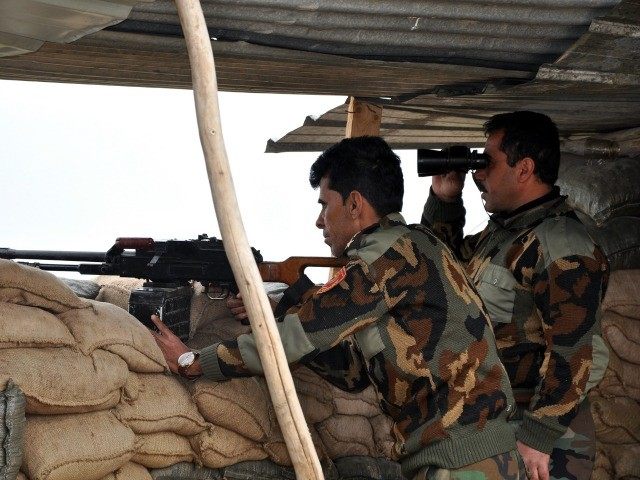While the Kurdish Peshmerga forces in Iraq have managed to hold back the Islamic State (ISIS) from key areas, including the stronghold of Erbil, Sunni Arabs displaced by ISIS attacks are protesting that the Kurdish army is not allowing them to return home following the pushback.
Kurdish Peshmerga forces in Iraq have been pivotal in stemming the spread of the Islamic State terrorist group, itself a Sunni Arab outfit, since the group began its unprecedented expansion last summer. While the Kurds have successfully protected Erbil and fought to protect Kurdish Yazidi populations near Mount Sinjar, Al Monitor reports that the Kurds have yet to attempt breaching some territorial lines near the city of Kirkuk, a move that would serve to protect the area’s Arab Sunni population.
Al Monitor notes that the Kurds have resisted an attempt to move the Islamic State further south of Kirkuk. When asked, Peshmerga Capt. Rebwar Mala Ali responded, “Why should we shed Kurdish blood for Hawija when we know the Iraqi government will claim it back once the IS threat is gone?”
Kurdish officials have made no mystery of their hopes that liberating swathes of Iraq and Syria from the Islamic State may lead to a conclusive creation of a Kurdish state. Their reluctance to act in Sunni Arab areas is not just a product of the fear of having their soldiers killed to help the Arab Shiite government in Baghdad, however; Sunni Arabs are the only acceptable population for the Islamic State in its territories, leading to fears that any Sunni Arab attempting to travel into Kurdish territory may be operating undercover for the Islamic State.
Human Rights Watch issued a report this week condemning Kurdish officials for restricting the freedom of movement of Sunni Arab civilians, claiming that “Kurdish forces for months barred Arabs displaced by fighting from returning to their homes in portions of Ninewa and Erbil provinces, while permitting Kurds to return to those areas and even to move into homes of Arabs who fled.” HRW also claims that Kurdish forces have destroyed dozens of Arab homes” in territories they have reclaimed. They also released a video featuring interviews and images of areas discussed in the report:
HRW nonetheless notes that Kurdish authorities eased restrictions on travel in January after the NGO issued their concerns for the rights of those affected. Kurdish Peshmerga leaders relayed to Human Rights Watch their concern that “many Arabs had assisted the ISIS advance and might again collaborate with the armed group.”
Complicating the situation is the history behind the Arab Sunni presence in many of the areas affected by Kurdish victories against the Islamic State. As Haaretz reports, many Kurds contend that Arab populations in areas near Kirkuk are illegitimate, artificially created by relocation initiatives during Saddam Hussein’s tenure. “Saddam brought Iraqis here to try and turn Kirkuk into an Arab city,” one Kurdish military leader tells Haaretz. “This was to change the population. But no one will take this city from us; this area–all of it–is Kurdish, Kirkuk is Kurdish.”
Reports earlier this month indicated that violence has increased in the newly liberated northern areas of Nineveh, near Mount Sinjar, where thousands of Yazidis–a religious sect composed of ethnic Kurds–were forced, upon the arrival of the Islamic State, to hide. Thousands more died on that mountain before the Peshmerga could rid the area of the Islamic State. Now, Yazidis returning to the area are allegedly engaging in revenge murders of Sunni Arabs who remained in the territory and, due to their ethnic and religious background, were spared by the Islamic State.
Those who escaped the ISIS siege of Sinjar told reporters and Kurdish soldiers that most of the violence against Yazidis did not come from foreign Islamic State invaders, but Arab Sunnis who lived in peace with Yazidis before ISIS’s arrival. “It wasn’t even IS who did most of the killing,” said one Yazidi refugee at the time. “It was our Sunni Arab neighbors. … We looked after these people’s children, and as soon as ISIS appeared, they immediately turned against us.”

COMMENTS
Please let us know if you're having issues with commenting.